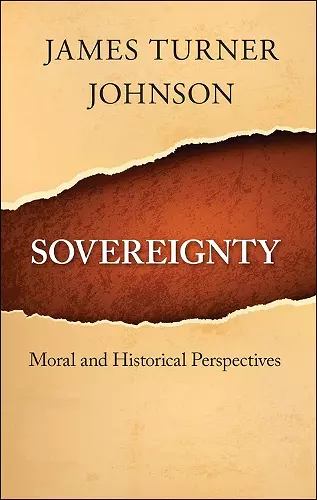Sovereignty
Moral and Historical Perspectives
Format:Hardback
Publisher:Georgetown University Press
Published:5th Mar '14
Currently unavailable, and unfortunately no date known when it will be back
This hardback is available in another edition too:
- Paperback£48.00(9781626160569)

James Turner Johnson's Sovereignty is a well-conceived and strongly documented examination of how the concept of sovereignty has evolved and changed from its inception until today. Combining ease of language with mastery of history, Johnson does his usual superb job of contributing substantially to the history of moral and political ideas. -- Brian Orend, author of The Morality of War, University of Waterloo, Department of Philosophy James Turner Johnson's study of two conceptions of sovereignty is not only of considerable historical interest. As he demonstrates, the relations between sovereignty as (1) responsibility for the common good and (2) the right of states to self-defense illumine current issues in international affairs, including those surrounding the challenge of radical Islamism and the attempt to forge norms related to the Responsibility to Protect. This is an excellent study, and deserves attention from a wide audience. -- John Kelsay, Richard L. Rubenstein Professor of Religion, Florida State University Unsurprisingly, James Turner Johnson has produced yet another landmark work on the use of military force. This time, though, he extends his reach to provide a nuanced and insightful exploration of the relationship between sovereignty and just war. Yet again, we-scholars, policy makers, and military officials-are indebted to him for combining history, ethics, and political theory in order to understand the responsibility to protect and the justice of using force. -- Anthony F. Lang, Jr., professor, School of International Relations, University of St. Andrews The conception of sovereignty in International Law has, since Westphalia, been locked into a state-centric model focused on the prevention of inter-state conflict. In this volume, Johnson brings his immense depth of historical knowledge to bear to demonstrate that there is a deeper and older understanding that focuses instead on the pursuit of the common good by the sovereign. He then deftly shows how dialogue between those understandings usefully illuminates contemporary questions such as responsibility to protect, human rights, and the dialogue with contemporary Islam. -- Martin Cook, Professor of Leadership and Ethics, United States Naval War College Scholars and policy makers alike have eagerly awaited this definitive study of the 'two conceptions' of sovereignty from the perspective of that history, as the prevailing conceptions of both state sovereignty and 'legitimate authority' have undergone serious erosion during the past two decades. Johnson's authoritative new examination of the historical evolution of these rival conceptions of sovereignty, both in the 'Dar al Islam' and the Christian West, will greatly reward its close study in this exemplary new book. -- George R. Lucas, US Naval Academy (retired) and Professor of Ethics and Public Policy at the Naval Postgraduate School, Monterey, California
Sovereignty generally refers to a particular national territory, the inviolability of the nation's borders, and the right of that nation to protect its borders and ensure internal stability. This book explores the historical idea of sovereignty as moral responsibility of government for the common good and its implications for contemporary issues.Sovereignty generally refers to a particular national territory, the inviolability of the nation's borders, and the right of that nation to protect its borders and ensure internal stability. From the Middle Ages until well into the Modern Period, however, another concept of sovereignty held sway: responsibility for the common good. James Turner Johnson argues that these two conceptions -- sovereignty as self-defense and sovereignty as acting on behalf of the common good -- are in conflict and suggests that international bodies must acknowledge this tension. Johnson explores this earlier concept of sovereignty as moral responsibility in its historical development and expands the concept to the current idea of the Responsibility to Protect. He explores the use of military force in contemporary conflicts, includes a review of radical Islam, and provides a corrective to the idea of sovereignty as territorial integrity in the context of questions regarding humanitarian intervention. Johnson's new synthesis of sovereignty deepens the possibilities for cross-cultural dialogue on the goods of politics and the use of military force.
Concise, lucid, and readable. . . Sovereignty is a welcome contribution to the philosophy of international politics. * Voegelinview *
ISBN: 9781626161054
Dimensions: unknown
Weight: 159g
176 pages